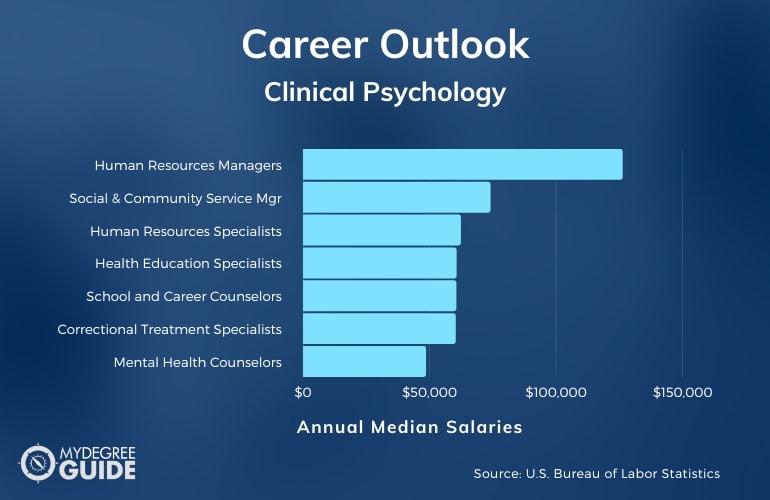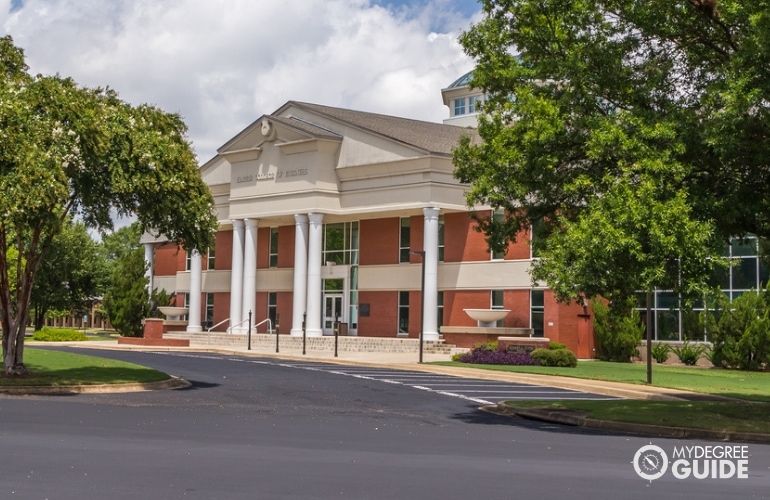With a clinical psychology degree, you can embark on a career that empowers you to guide and support people struggling with mental health disorders.

If you have a passion for helping others, this type of degree may be the first step toward a bright and fulfilling career.
Editorial Listing ShortCode:
As a clinical psychology major, you will explore how to assess, diagnose, and treat mental illnesses. This can help you prepare for employment in areas like patient care, education, and management.
Universities Offering Online Bachelors in Clinical Psychology Degree Programs
Methodology: The following school list is in alphabetical order. To be included, a college or university must be regionally accredited and offer degree programs online or in a hybrid format.
Colorado Christian University
Colorado Christian University offers a BS in Applied Psychology. The program is fully online. It offers options to choose an emphasis and accelerate to a master’s degree. Emphases offered include Biblical Studies, Christian Counseling, and Criminal Justice. The program’s psychology courses are taken in 8 week blocks. CCU has a generous transfer credit policy.
Colorado Christian University is accredited by the Higher Learning Commission.
Eastern Oregon University
Eastern Oregon University offers a BA and a BS in Psychology. Both programs are fully online and offer concentrations in Applied Psychology and Experimental Psychology. To graduate, students must complete 180 credits and may be able to transfer in up to 135 qualifying credits. The program can potentially be completed in 4 years.
Eastern Oregon University is accredited by the Northwest Commission on Colleges and Universities.
Faulkner University
Faulkner University offers a BS in General and Clinical Psychology. The program is entirely online. The degree requires the completion of 121 credit hours. Courses are asynchronous. Students may choose electives to customize their degrees. Potential courses in the program include Theories of Personality, Psychology of Religion and Spirituality, and Abnormal Psychology.
Faulkner University is accredited by the Southern Association of Colleges and Schools Commission on Colleges.
Franciscan University of Steubenville
Franciscan University of Steubenville offers a Bachelor’s in Clinical Psychology that can be earned entirely online. The classes are taught from a Catholic perspective. During their senior year, students must complete a senior thesis or seminar and 150 clinical hours. Two Catholic psychology electives are also required.
The Franciscan University of Steubenville is accredited by the Higher Learning Commission.
Louisiana State University
Best-universities.net ranked Louisiana State University in the top three colleges for online bachelor’s degrees. LSU offers a BS in Psychology with a concentration in Clinical Psychology. The program is fully online. It requires the completion of 120 credit hours, and some classes are offered in a synchronous format. A potential course in the program is History of Modern Psychology.
Louisiana State University is accredited by the Southern Association of Colleges and Schools Commission on Colleges.
Methodist University
Methodist University offers a BS in Psychology with a concentration in Counseling and Clinical Psychology. The program is offered entirely online and can potentially be finished in just 3.5 years. It requires the completion of 124 credit hours and up to 93 qualifying credits may be transferred in. Courses are offered in an 8 week accelerated format.
Methodist University is accredited by the Southern Association of Colleges and Schools Commission on Colleges.
Metropolitan State University of Denver
U.S. News & World Report named Metropolitan State University of Denver the third most innovative college in the country. MSU of Denver offers a BS in Psychology with a Clinical and Counseling concentration. Students may choose between fully online and hybrid formats. Potential courses in the program include Psychology of Gender and Theories of Personality.
MSU Denver is accredited by the Higher Learning Commission.
Regent University
Best Health Degrees ranked Regent University #7 among the best online bachelor’s degrees in counseling. The school offers a BS in Psychology with an emphasis in Clinical and Counseling Psychology. The program is offered fully online and on campus. Courses are presented through a Christian worldview. To graduate, students must complete at least 120 credit hours.
Regent University is accredited by the Southern Association of Colleges and Schools Commission on Colleges.
University of Central Florida
U.S. News & World Report named the University of Central Florida among the best online bachelor’s in psychology. UCF offers a BS in Psychology. The program offers several tracks, including a Clinical Psychology track. The program requires the completion of 120 credit hours. There are start dates offered in the fall, spring, and summer.
The University of Central Florida is accredited by the Southern Association of Colleges and Schools Commission on Colleges.
University of Wisconsin – Stout
The University of Wisconsin—Stout offers a BS in Psychology with a concentration in Clinical and Counseling Psychology. The program is available fully online. All online students pay the same tuition regardless of residency. Students may be able to finish the program in just 3 years. A potential course offered in the program is Social Cognition and Behavior. The program also offers internship opportunities.
UW Stout is accredited by the Higher Learning Commission.
Online Bachelor’s in Clinical Psychology Degrees

People who specialize in clinical psychology may become experts in mental health disorders—such as post-traumatic stress and anxiety—as well as substance abuse and addiction. You can learn how to evaluate patients’ symptoms and determine the best form of treatment.
While earning a clinical psychology degree, you will explore topics like:
- Human growth and development
- Abnormal behavior
- Personality development
- Data collection and analysis
- Research methods
- Communication styles
- Theories of psychology
- Neuroscience
With a major in clinical psychology, you can learn how to interview, observe, diagnose, and treat patients, with a focus on psychotherapy techniques.
Some programs also include a practicum or capstone component, which allows you to have hands-on experience in the field. After graduating, many students who want to become licensed clinical psychologists go on to obtain a doctoral degree, such as a PhD or a PsyD. Pursuing an online PhD in Social Psychology is one pathway to fulfill the core requirement for psychologist licensure in most states.
Graduates who prefer to immediately join the workforce, or who want to work while earning their advanced degrees, can choose from a variety of career paths. The types of organizations that hire clinical psychology professionals include:
- Hospitals
- Psychiatric facilities
- Medical clinics
- Schools
- Universities
- Government agencies
- Correctional facilities
- Non-profits
- Private businesses
With a clinical psychology background, you may be well-positioned to apply for a position as a counselor who focuses on mental health disorders, addiction, or rehabilitation. Some graduates go on to work as mental health educators or administrators.
Other clinical psychology majors pursue careers as human resources specialists, school counselors, or correctional officers. All of these positions require knowledge of human behavior that you can develop over the course of this degree.
Clinical Psychology Careers and Salaries

Clinical psychology centers on the study of mental health, which is applicable to many different kinds of careers. Psychology professionals often excel at mediating conflict, creating healthy environments, and reducing stress levels.
Graduating with a bachelor’s degree in clinical psychology may help you qualify for jobs with medical clinics, schools, correctional facilities, and private businesses. All of these organizations seek employees who specialize in analyzing and interpreting human behavior. According to the Bureau of Labor Statistics, these are some of the potential career options for professionals in this field.
| Careers | Annual Median Salaries |
| Human Resources Managers | $126,230 |
| Social and Community Service Managers | $74,000 |
| Human Resources Specialists | $62,290 |
| Health Education Specialists | $60,600 |
| School and Career Counselors and Advisors | $60,510 |
| Probation Officers and Correctional Treatment Specialists | $60,250 |
| Substance Abuse, Behavioral Disorder, and Mental Health Counselors | $48,520 |
| Community Health Workers | $46,590 |
| Social and Human Service Assistants | $37,610 |
| Psychiatric Technicians and Aides | $36,230 |
Data from the Bureau of Labor Statistics shows that many of these positions have median salaries that are well above the average for all occupations, which is $45,760.
Many of these roles also have faster-than-average growth rates. This translates to ample career opportunities for up-and-coming professionals. In particular, substance abuse, behavioral disorder, and mental health counselors are expected to experience accelerated job growth of 22% over the next ten years (Bureau of Labor Statistics).
BS in Clinical Psychology Curriculum & Courses

Most clinical psychology undergraduate programs focus on both theoretical and applied aspects of the field. In addition to general education requirements such as English and math, students pursuing a degree in clinical psychology can expect to take courses like:
- Research Methods in Psychology: In this course, you’ll learn how to conduct experiments, gather and analyze data, and present your findings.
- Abnormal Psychology: The focus of this course is the classification, diagnosis, and treatment of abnormal behavior.
- Behavioral Neuroscience: Students in this class examine the foundation of behavior, including neuroanatomy and neurophysiology.
- Social Psychology: In this class, you’ll explore theoretical and experimental perspectives on people’s belief systems and attitudes.
- Cognition and Learning: This course centers on topics such as attention, visual imagery, memory, decision-making, and problem-solving.
- Qualitative Methods in Clinical Psychology: Students in this course develop skills in qualitative research methods like interviewing, group discussions, and observation.
- Statistics for the Behavioral Sciences: In this class, you’ll learn how to use statistical analysis methods, such as variance and covariance, in psychological research.
- Personality: This course allows you to explore major theories of personality development and assessment.
- Diversity and Multicultural Issues in Psychology: You’ll examine cultural influences on psychology and concerns related to working with diverse populations.
- Human Development: In this course, you’ll learn about the development and changes in psychology over the course of the human lifespan.
You may also have the opportunity to take electives that further your skills in specific areas of interest, such as human sexuality, the psychology of aging, and the psychobiology of stress.
How to Choose an Online Bachelor’s in Clinical Psychology Program

Choosing the right clinical psychology bachelor’s degree program can involve assessing and comparing many different programs. Some important factors include:
- Cost. The price of college tuition differs significantly based on the type of school you attend. For instance, you can determine whether you will be paying in-state or out-of-state tuition, as that can also greatly affect the price of your education.
- Accreditation. Many employers will only accept degrees from accredited colleges. If one of your school options does not state that it is accredited or which accrediting body awarded its status, you might want to verify its status with the US Department of Education or look for alternative programs.
- Support services. Many colleges offer support services for online students that mirror the resources available on campus. You can check to see if the school offers access to services like tutoring, career counseling, and library research specialists.
- Format. Online courses can be asynchronous, meaning that you complete the coursework at the time that works best for you, or synchronous, which requires you to attend virtual classes at a specific day and time. Some programs offer classes in a single format while others have a mix of synchronous and asynchronous options.
Other aspects of school programs that you may want to consider include whether you can attend part-time and how many credit hours are required. Determining which factors are most important to you may help you find the school that’s the best fit for your needs.
Admissions Requirements

Every clinical psychology bachelor’s program has specific admission requirements, but here are some common criteria:
- Test scores. While it is becoming less common, some programs require minimum ACT or SAT scores for admission.
- Letters of recommendation. You can ask former instructors to describe your strengths and abilities.
- Personal statement. You may be asked to write an essay explaining your goals or background.
- Transcripts. You’ll submit official records from high school and any previous college work.
Some schools will look at your transcripts to verify that you had a certain GPA or took specific kinds of courses when attending high school.
Accreditation

To prove that they are offering the best possible academic experience, programs can seek national or regional accreditation status. This involves the school completing a thorough assessment and meeting certain standards. Schools with regional accreditation have met the highest possible bar for excellence.
As a result, employers tend to look more favorably for degrees from regionally accredited programs. It is also generally easier to transfer credits from a regionally accredited school. This may be important if you choose to transfer to a different college or university in the future or if you pursue an advanced degree after receiving your bachelor’s.
Clinical Psychology Majors Financial Aid and Scholarships

When you research degree programs, you may also want to explore the many opportunities available for financial aid. Submitting a Free Application for Federal Student Aid (FAFSA) is a strategic place to begin your search for financial support. This application will determine whether you are eligible for aid from the federal government.
Your state may also offer grant programs that can help offset the cost of your tuition. If you are currently working, you might consider speaking with your employer about whether they offer a tuition assistance or reimbursement program. Many companies offer this form of aid to help their employees advance and develop new skills.
Scholarships are another important avenue for aid. You can search an online scholarship database for aid opportunities tailored to your degree or life circumstances, such as if you are a first-generation college student.
What Is a Clinical Psychology Bachelor Degree?

A clinical psychology bachelor degree is an undergraduate degree that focuses on the history, theories, and applications of psychology. Students in clinical psychology bachelor’s programs learn how to evaluate, diagnose, and treat a range of mental health disorders.
Over the course of a clinical psychology degree, you can develop the skills necessary to assess patients and offer treatment through strategies like psychotherapy and cognitive behavioral therapy. You would focus heavily on research, data analysis, and communication. Students in this kind of program can also expect to practice applied skills, such as interviewing, assessing, and observing patients.
Is Clinical Psychology a Good Career?

Yes, clinical psychology is a good career for many professionals. Many positions related to clinical psychology earn above-average salaries. According to the Bureau of Labor Statistics, the median yearly salary for clinical and counseling psychologists is $82,510.
Other career paths are equally promising. School and career counselors and advisors, for example, have a projected growth rate of 10% over the next ten years and have median earnings of $60,510 a year. There is also a growing need for substance abuse, behavioral disorder, and mental health counselors.
Clinical psychology professionals also have options in terms of types of employers. Government agencies, universities, and hospitals all seek graduates of these degree programs.
What Degree Do You Need to Be a Clinical Psychologist?

A bachelor’s degree in clinical psychology serves as an excellent foundation for students hoping to work as clinical psychologists, but the educational requirements for this career don’t end there.
To become a licensed professional in this field, it’s necessary to hold an advanced degree. Practicing clinical psychologists generally have either a PhD in Psychology or a Doctor of Psychology (PsyD). Many also obtain an on-campus or online masters in clinical psychology between their undergraduate and doctoral studies.
You can apply for licensure as a clinical psychologist once you’ve completed all of your state’s education and fieldwork requirements.
What Can You Do with a Bachelor’s Degree in Clinical Psychology?

A bachelor’s degree in clinical psychology may help you qualify for a variety of positions. Organizations both in and outside of the medical field seek employees who understand human behavior. Some clinical psychology graduates become counselors in settings like schools, rehabilitation facilities, and mental health clinics.
Others work as aides or technicians in psychiatric hospitals, often while pursuing doctoral degrees in psychology. This type of bachelor’s degree may also help prepare you for a leadership position. Medical managers and human resources managers are in high demand and make above-average salaries.
How Long Does It Take to Get an Online Bachelor Degree in Clinical Psychology?

A clinical psychology bachelors degree typically requires students to complete around 120 credit hours to graduate. Most full-time students can meet this requirement in 4 years, but there are several factors that can influence how long it takes to finish a degree.
Students who have dual-enrollment credits or who take summer classes may be able to graduate in a shorter span of time. Part-time students, on the other hand, may need longer to complete their studies.
What’s the Difference Between Psychiatry vs. Clinical Psychology?
If you’re interested in helping patients work through mental health struggles, psychiatry and clinical psychology are both viable paths. The requirements and focus of these fields are notably different.
| Psychiatry | Clinical Psychology |
|
|
Students who prefer to treat patients through strategies like talk therapy may be better suited to a clinical psychology degree. At the bachelor level, both of these disciplines may lead to similar entry-level roles.
What’s the Difference Between a Bachelor in Clinical vs. Counseling Psychology?
The overlapping areas of clinical psychology and counseling psychology are separated by a few key factors.
| Bachelor in Clinical Psychology | Bachelor in Counseling Psychology |
|
|
Clinical and counseling psychology overlap in many ways, and students who pursue either degree will learn about human behavior and issues related to mental health.
Is a Bachelors in Clinical Psychology Degree Worth It?

Yes, a bachelors in clinical psychology degree is worth it for many professionals. Clinical psychology can be a professionally and personally fulfilling field, particularly if your goal is to help people in need.
As society has become more accepting of mental health disorders, the need for experts in this area has expanded. As a result, the field offers a great degree of job stability for the foreseeable future. For instance, the projected growth rates for psychiatric technicians (11% job growth) and substance abuse, behavioral disorder, and mental health counselors (22%) are much faster than average (Bureau of Labor Statistics).
Getting Your Bachelor in Clinical Psychology Degree Online

If your goal is to help people improve their mental health, overcome obstacles, and live better lives, a bachelor’s degree in clinical psychology could help you build foundational skill sets.
Professionals in this field can make a real difference in people’s everyday lives. During your clinical psychology schooling, you can learn why humans behave the way that they do and how to treat disorders like depression and anxiety.
Whether you hope to apply these skills to a career in counseling, human resources, or social services, you can begin your journey by researching online degree programs in psychology from accredited schools.
